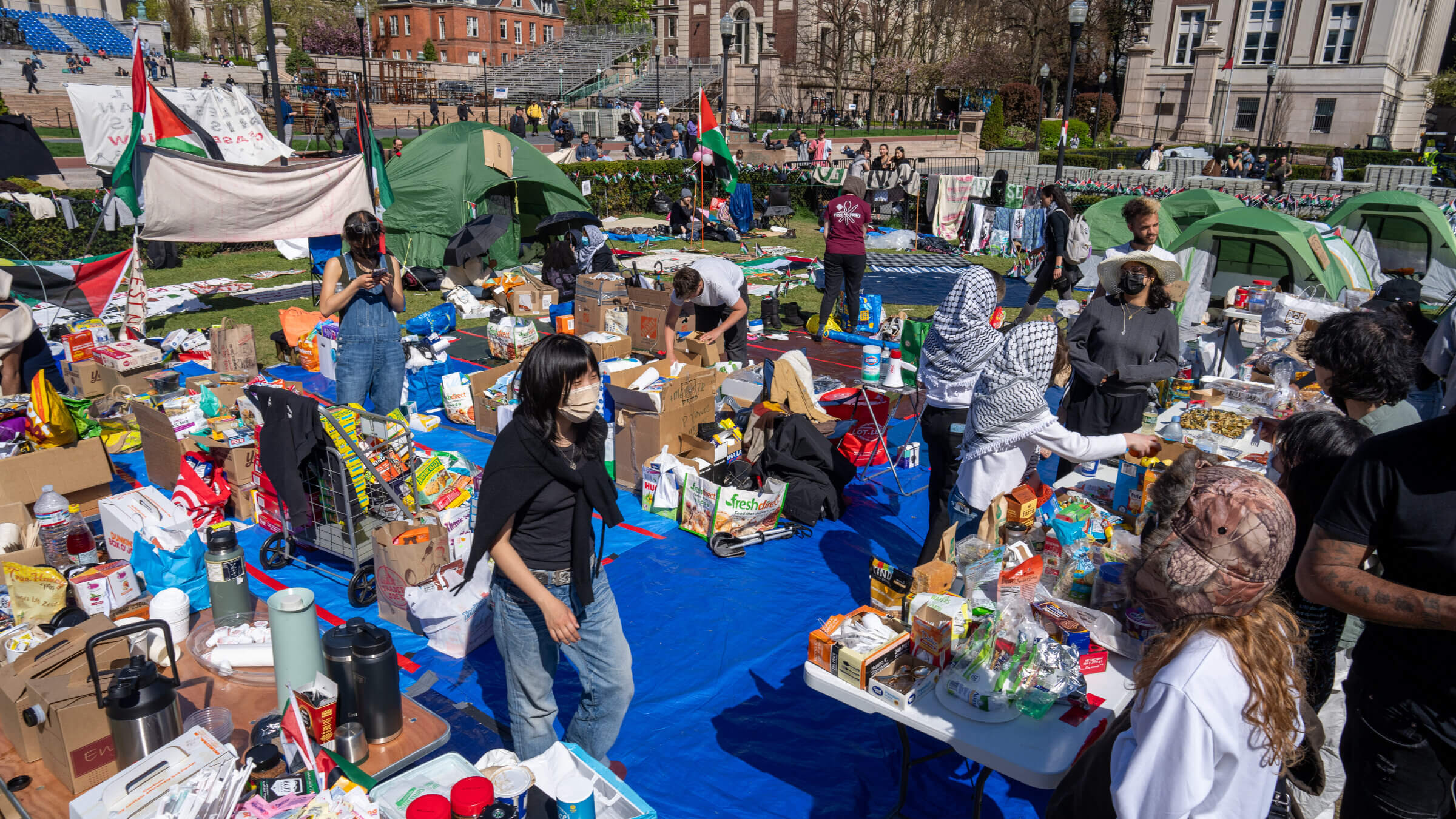‘A culture of harassment’: Hillel’s CEO sees trouble for Jews in new spate of campus clashes
Adam Lehman on whether it’s right to call police in to arrest students, and how cautious Jewish families should really be around campus life

NEW YORK, NEW YORK – APRIL 22: Pro-Palestinian protestors established an encampment on the grounds of Columbia University on April 22, 2024 Photo by David Dee Delgado/Getty Images
In the past week, the protests roiling American college campuses since Oct. 7 have intensified, with students establishing encampments in the center of campuses — beginning with Columbia University — and college presidents, in several cases, calling in the police to arrest students.
I spoke with Adam Lehman, CEO of Hillel, the largest Jewish campus organization in the world, which maintains a presence at more than 700 American universities, about his thoughts during this fraught moment. This interview has been edited for length and clarity.
What’s your take on the rise of anti-Israel activity on campuses in the past week, and universities’ tougher responses to those protests — including calling in the police to arrest students at Columbia and Yale, among other campuses?

These out-of-control encampments are hugely problematic. They are preventing students from taking advantage of the campus activities they’re supposed to be focused on. However well-meaning some of the protest activities may be, they’re fostering a culture of harassment and intimidation focused on Jewish students, Israeli students, and in some cases even leading to physical assault.
This current wave of protest activities is just straight ahead trafficking in discriminatory, exclusionary and sometimes violent language that we would not tolerate if it was being directed at any other minority population or group.
Do you think university presidents should call in the police to arrest students?
I don’t see how responsible university leaders, at this point, can’t call on law enforcement for support. At Columbia, at Yale, and increasingly at other universities, administrators have actually been very patient with protesters who are blatantly and frequently violating the most basic policies and codes of conduct at these schools. None of the universities is saying these students don’t have a right to protest. All of the schools are providing really meaningful spaces and opportunities for protesters to express their passions and points of view.
Jonathan Greenblatt, head of the Anti-Defamation League, suggested on Monday that if Columbia is not going to bring New York City police back on campus, New York Gov. Kathy Hochul should call in the National Guard. What do you think of that suggestion?

We’re not in a position to opine on which local or national security forces will be most effective or most merited in this context. I do worry that, as we continue to escalate the scale of interventions that we’ve seen, those approaches can sometimes actually backfire and create even more conflict and combativeness.
Some rabbis and others have encouraged Jewish students to leave campuses that have become particularly heated. Is Hillel advising that?
We have not been advising students to leave campus, even at campuses where we’ve seen really high levels of conflict. We believe students and their families can make their own decisions.
That said, we’re providing extra staffing to make sure we can support Jewish students, and really any other student looking for support under these challenging conditions. And we are demanding that university administrations and law enforcement take action to retake control of campuses.
Your youngest child graduated from college not long before Oct. 7. Are you glad your two children finished college before so many campuses became embroiled in protests?
At our Seder last night, relatives and I were saying how thankful we are that our kids are no longer on campus in this moment. It’s just so emotionally challenging for many students. It’s, without question, taking away from the core experience of being in a healthy, supportive learning community.
Thankfully there are lots of schools where the experience is overall a positive one. But that can’t be an excuse for us not addressing these very real issues that are plaguing a growing number of campuses.
Speaking of antisemitism plaguing campuses, the ADL recently released a report card that gave F and D grades to a large number of campuses with a significant number of Jewish students. What did you think of the report card, which many Jewish students and leaders considered counterproductive?
We believe that, however well-meaning, whenever organizations try to reduce the state of Jewish students’ experience to a single score, it’s neither accurate nor constructive. Unfortunately, as Rabbi Gil Steinlauf of Princeton pointed out, it can lead to a reduction in Jewish communities in schools that offer overall a strong Jewish student experience and as a result, become a negatively self-fulfilling prophecy.
What do you think about the University of Southern California’s decision to cancel a Muslim American student’s valedictorian commencement speech after pro-Israel groups voiced concerns about her anti-Israel social media posts?
By no means should Jewish students or the Jewish community be held responsible for the decisions of the USC administration. It’s unfortunate that, when they considered the several hundred candidates who qualified to serve as valedictorian, they didn’t consider the inflammatory, antisemitic or potentially antisemitic comments that the person had shared. Had they been more careful and thoughtful, they likely could have avoided this whole controversy.
You were a Dartmouth College student in the 1980s, when the protests roiling campuses were over apartheid in South Africa. How do the protests on campuses today compare to the ones you saw as a student?
Protest culture today feels very different from what I experienced as a college student. Today’s environment counterposes and puts in conflict sizable campus communities. In the 1980s, there weren’t two active sides to that conflict on campus. And there were not large communities on campus who felt ostracized and discriminated against by virtue of those protest activities.
They are very specifically targeting entire groups of students based on their core identity. When student chant “Zionists have to go” or even “Death to Zionists,” that is not only hurtful but directly threatening many, many students who see Israel as a part of their Jewish identity and who, just last night, went through Seders full of references to an understanding of the role that Israel has played as part of Jewish identity in Jewish history and Jewish theology for thousands of years.






















